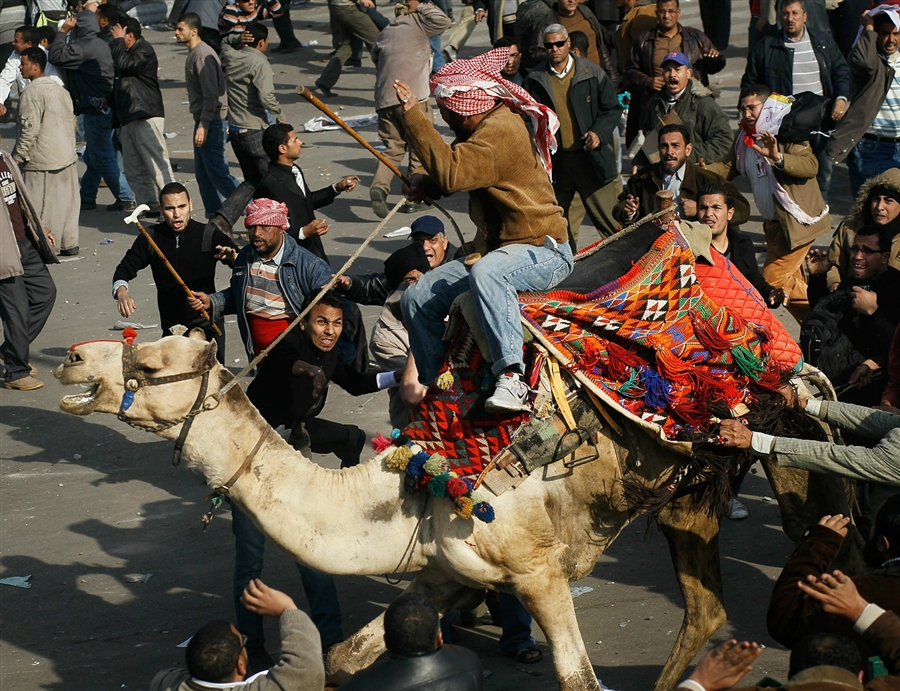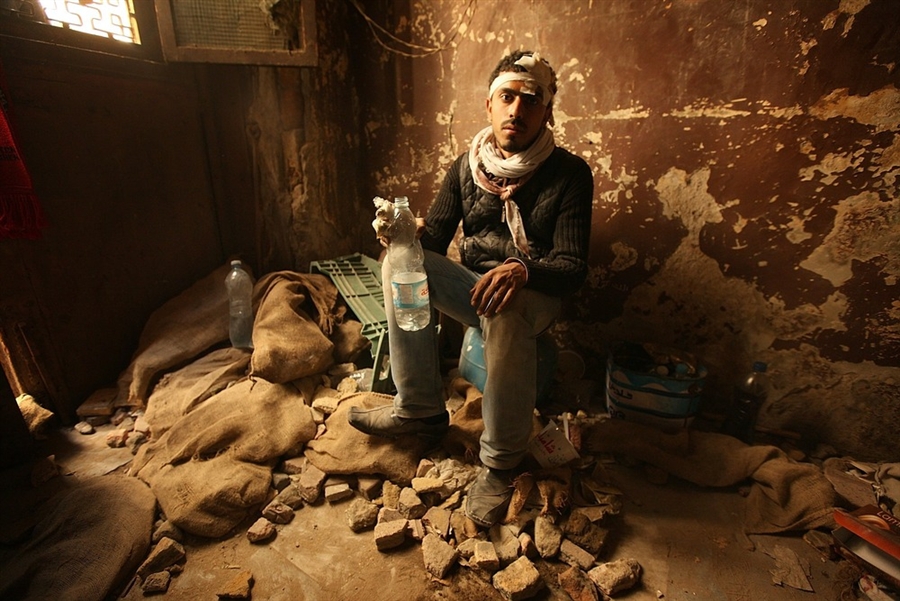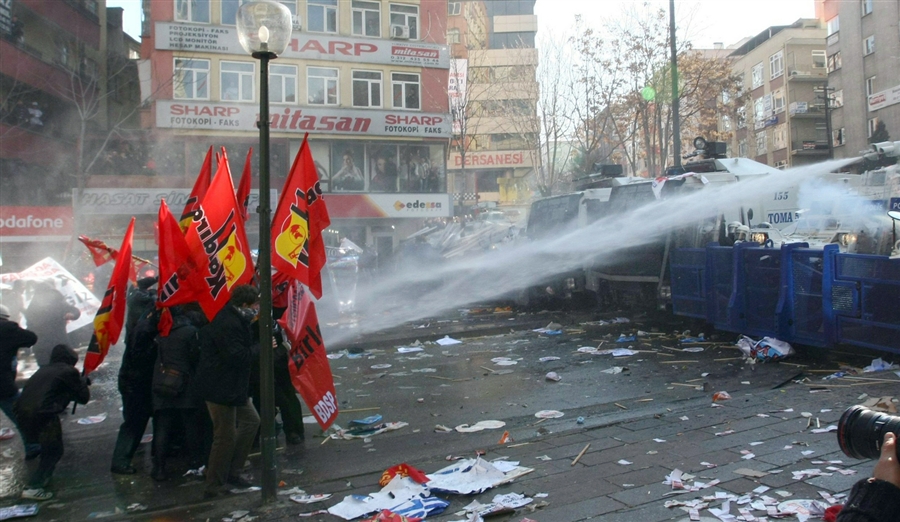The question is always when does civil disobedience transform itself into meaningful political change. When do mass demonstrations and the counterpart of the riot become a genuine revolution….
The senate house in flames; mobs roaring and rioting in the Forum, full of hate, hungry for blood- off they went looting and pillaging. Confronted by rival gangs, they fought and killed even in the Sacra Via itself, not once, but year after year as the Roman Republic crumbled. And the empire of Augustus only brought an uneasy peace. Social welfare, free food, and free fun kept the excesses down, but it required little; rumor, bribes, stirring oratory- to bring the mobs back into the streets.

Chomsky:It’s worth remembering that on his way to that famous speech in Cairo, which was supposed to be a conciliatory speech towards the Arab world, he was asked by the press—I think it was the BBC—whether he was going to say anything about what they called Mubarak’s authoritarian government. And Obama said, no, he wouldn’t. He said, "I don’t like to use labels for folks. Mubarak is a good man. He has done good things. He has maintained stability. We will continue to support him. He is a friend." And so on. This is one of the most brutal dictators of the region, and how anyone could have taken Obama’s comments about human rights seriously after that is a bit of a mystery. But the support has been very powerful in diplomatic dimensions. Military—the planes flying over Tahrir Square are, of course, U.S. planes. read more:http://www.democracynow.org/2011/2/2/noam_chomsky_this_is_the_most image: http://photoblog.msnbc.msn.com/_nv/more/section/archive?date=2011/2
Noam Chomsky: Well, first of all, what’s happening is absolutely spectacular. The courage and determination and commitment of the demonstrators is remarkable. And whatever happens, these are moments that won’t be forgotten and are sure to have long-term consequences, as the fact that they overwhelmed the police, took Tahrir Square, are staying there in the face of organized pro-Mubarak mobs, …The United States, so far, is essentially following the usual playbook. I mean, there have been many times when some favored dictator has lost control or is in danger of losing control. There’s a kind of a standard routine—Marcos, Duvalier, Ceausescu, strongly supported by the United States and Britain, Suharto: keep supporting them as long as possible; then, when it becomes unsustainable—typically, say, if the army shifts sides—switch 180 degrees, claim to have been on the side of the people all along, erase the past, and then make whatever moves are possible to restore the old system under new names. That succeeds or fails depending on the circumstances.Read More:http://www.democracynow.org/2011/2/2/noam_chomsky_this_is_the_most a

"My sense is that we tend to overstate the power of the quantitative data around use early on, ignoring the realities that often populist revolutions are fueled by a smaller group that tends to be literate, educated, and more tightly knit. The ability to author and share information via the internet nomadically (without having to assemble in the same place in other words), via such modes as scrambled proxy servers, and work on a message and strategy through coordinated sharing and reflection on information (like what we do when we co-write a paper on google docs, or respond to one another on a facebook wall post), speaks to the power that the internet has early on in terms of impacting causality and potential for a movement to actually occur. Moreover, these networks may move beyond borders – Egyptian activists today have pointed out that they were in internet-facilitated contact with activists in Tunisia as an example...." Read More: http://rameshsrinivasan.org/2011/01/28/social-medias-power-wheres-the-net-delusion/ image: http://photoblog.msnbc.msn.com/_nv/more/section/archive?date=2011/2
…When the capital of the empire moved to the east, the mob was not lost. At Byzantium it rioted with equal violence, played on by oligarchs and factions in politics and religion. For centuries the mob rose and destroyed, tearing down buildings, pillaging, burning, and howling as it went.
In the summer of 1780, London erupted. By June 7, the city was a sea of flames; the prisons were broken open; the breweries were looted, and the gutters flowed with beer. Roman Catholic chapels and households were first desecrated, then wrecked, and finally burned. Among the rioters at least three hundred were shot dead, 175 wounded, and almost 500 taken prisoner. These, the Gordon Riots, were unusual only in their extent. There had been wild rioting, burning and looting in the 1760’s and 70’s; in 1733,1736, and 1753 London had been at the mercy of mobs, as it had been time and time again during the previous century. …

Anti government demonstration Ankara. Feb.3. ---As more citizens are galvanized to protest and take to the streets, they have turned to the internet for information and Twitter/Facebook and other social media tools for coordination and updates. A Facebook page devoted to Friday’s planned protests had more than 80,000 followers as of 2 p.m. ET Thursday, compared with some 20,000 the previous day, according to another report. Once the movement has scaled to these levels, the technologies function to coordinate large numbers, which would not be easily achievable before, according to reports from the BBC, CNN, and Al Jazeera. Egypt is also the most populous nation in the Arab World, adding to this issue of scale. Facebook pages in memory of a dead victim ‘Khaled Said’, invoke the massive attention focused on Neda, the young woman assassinated during Iran’s Green revolution. And the hashtag #jan25 is dominating worldwide trends on Twitter.... read more: As more citizens are galvanized to protest and take to the streets, they have turned to the internet for information and Twitter/Facebook and other social media tools for coordination and updates. A Facebook page devoted to Friday’s planned protests had more than 80,000 followers as of 2 p.m. ET Thursday, compared with some 20,000 the previous day, according to another report. Once the movement has scaled to these levels, the technologies function to coordinate large numbers, which would not be easily achievable before, according to reports from the BBC, CNN, and Al Jazeera. Egypt is also the most populous nation in the Arab World, adding to this issue of scale. Facebook pages in memory of a dead victim ‘Khaled Said’, invoke the massive attention focused on Neda, the young woman assassinated during Iran’s Green revolution. And the hashtag #jan25 is dominating worldwide trends on Twitter. image: http://photoblog.msnbc.msn.com/_nv/more/section/archive?date=2011/2
Christopher Hitchens: So multifarious are the sources of grievance in the Arab world that it could have been any one of a host of pretexts that ignited a revolt, or revolts. This ought to make one beware of too glibly selecting the ostensibly crucial one. Poverty and unemployment? These are so pervasive that they could explain any rebellion at any time — and in any case Tunisians are among the richest per capita in North Africa. Dictatorship and repression? Again, these are commonplaces, and so far the most conspicuously authoritarian despotisms — Syria and Saudi Arabia, for instance — have been spared the challenge of insurrection. (May these words of mine go out of date with all speed.) Read More: http://www.nationalpost.com/todays-paper/Fighting+Honour/4207354/story.html
I think that the factor of indignity and shame, of the sort manifested in the anecdote above, makes a more satisfactory initial explanation. And one of the cheering and reassuring things about dictatorship is the way that it consistently fails to understand this element of the equation. How gratifying it is that all such regimes go on making the same obvious mistakes. None of them ever seems to master a few simple survival techniques: Don’t let the supreme leader’s extended family go on shopping sprees; don’t publicly spoil some firstborn as if the people can’t wait for him, too, to be proclaimed from the balcony; don’t display your personal photograph all over the landscape; don’t claim more than, say, 75% of the vote in any “election” you put on. And don’t try to shut down social media: It will instantly alert even the most somnolent citizen to the fact that you are losing, or have lost, your grip.

Hitchens: People do not like to be treated like fools, or backward infants, or extras in some parade. There is a natural and inborn resistance to such tutelage, for the simple-enough reasons that young people want to be regarded as adults, and parents can't bear to be humiliated in front of their children. One of Francis Fukuyama's better observations, drawing on his study of Hegel and Nietzsche, was that history shows people just as prepared to fight for honour and recognition as they are for less abstract concepts like food or territory. / Protest against proposed legislation. f
. Ankara. read more: http://photoblog.msnbc.msn.com/_nv/more/section/archive?date=2011/2Read More: http://www.nationalpost.com/todays-paper/Fighting+Honour/4207354/story.html
…Not only in London but in towns throughout the kingdom generations of Englishmen had to learn to live with riots as they did with disease or death. It became part of the nature of society. Nor was rioting an Englishman’s vice. Across the channel they were just as violent. In the 1620’s, 30’s and 40’s France erupted in bloody riots that, in Normandy, finally turned into a peasant’s war. For the rest of the century scarcely a year passed without mobs coming out in the streets of some provincial town or of Paris itself. They wreaked heir vengeance on those whom they thought responsible for heir misery.

"It is an unusual swipe at the Islamists who have promoted the practice as in keeping with religion, especially since the government generally tries to avoid taking on conservative religious leaders. It tries to position itself as the guardian of Islamic values, aiming to enhance its own wilted legitimacy and undercut support for the Muslim Brotherhood, the banned but popular opposition movement. But the religious discourse concerning genital cutting has changed, and that is credited to Ms. Assaad’s strategy of reaching up to people like Mrs. Mubarak and out to young women like Fatma Ibrahim, 24. When Ms. Ibrahim was 11 years old, she said, her parents told her she was going for a blood test. The doctor, a relative, put her to sleep and when she woke, she said she could not walk. The memory haunts her now, and though she says that her parents “will kill” her if they find out, she has become a volunteer in the movement against genital cutting, hoping to spare other women what she endured." read more: http://thebabyboomerqueen.wordpress.com/2007/09/20/female-circumcision-very-high-in-egyptor-shall-we-call-it-female-genital-mutilation/
The French revolution changed the nature of European riots quite fundamentally. The mobs began to acquire more than a directing intelligence and to fall under the leadership of political strategists bent on using them for long-term ideological ends. Gradually, the dispossessed and the frustrated acquired a deeper, a more ruthless, sense of identity, which encompassed violence, tragedy, pain, and even death for the sake of the future. And so the riot became an instrument of revolution. The European towns and countryside became even more violent in the nineteenth-century; and England did, too, at least until 1850.
ADDENDUM:
Conrad Black: The army could probably be motivated to put down vandalism and unruly demonstrations against a Mubarak clinging to a slightly more dignified exit than that of the hapless and hastily departed president of Tunisia. Decades of pampering and indulging the officer corps should buy the President at least that. The endless blathering about the “Arab street” on CNN and other such sources of instant insight is piffle; almost the only thing Arab governments know is how to suppress mobs — if, that is, the governing authority controls the army. The Egyptian army’s prestige is based on the combination of its penetration of the Israeli Bar Lev Line on the Suez Canal in the Yom Kippur War of 1973, and the systematic suppression of the fact that Richard Nixon and Henry Kissinger prevailed upon Golda Meir and Ariel Sharon not to force the surrender of the southern Egyptian army in the same war, in order to enable Sadat to make an honourable peace of equals. In a not overly glorious country, a little martial valour goes a long way.





 COMMENTS
COMMENTS